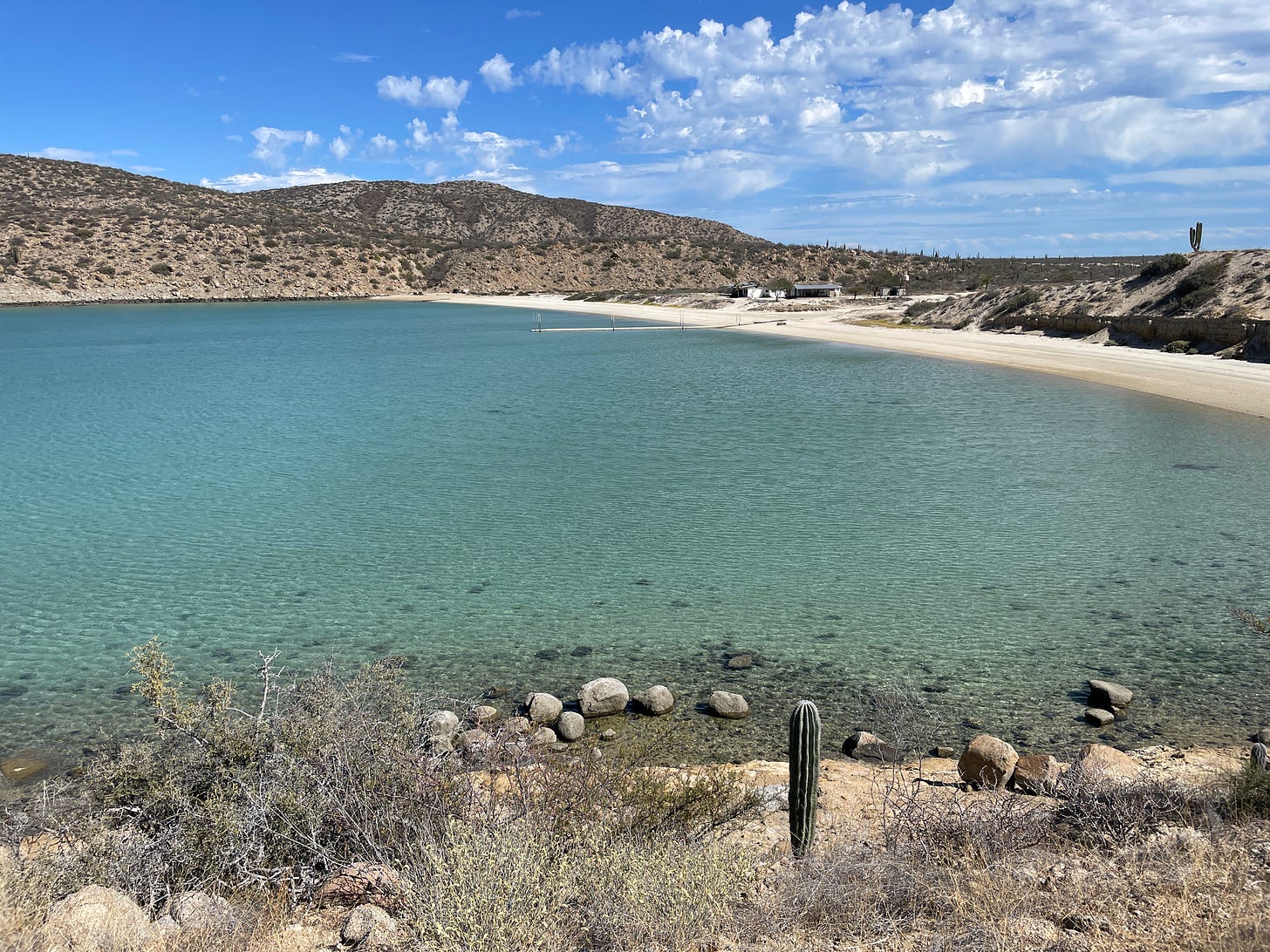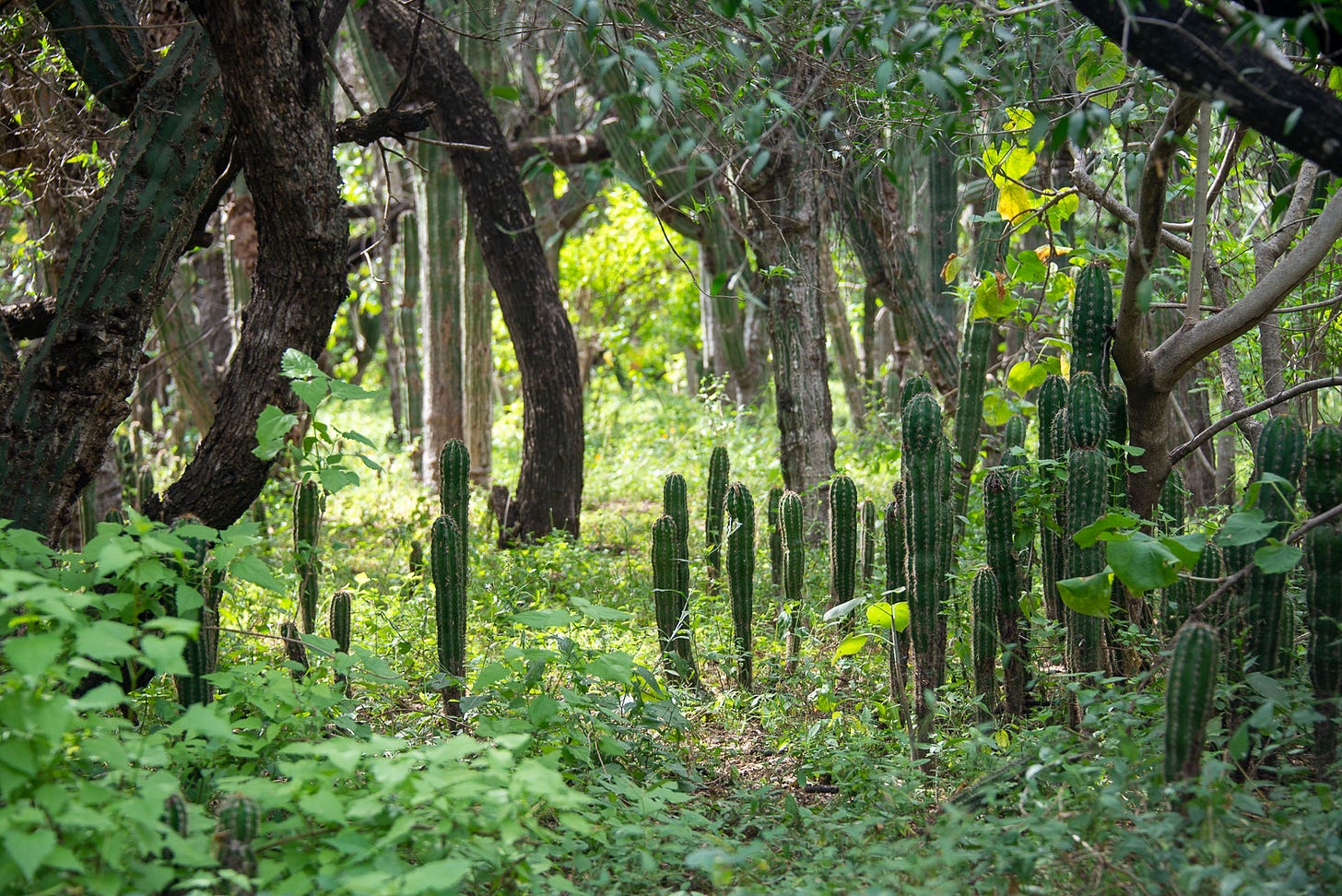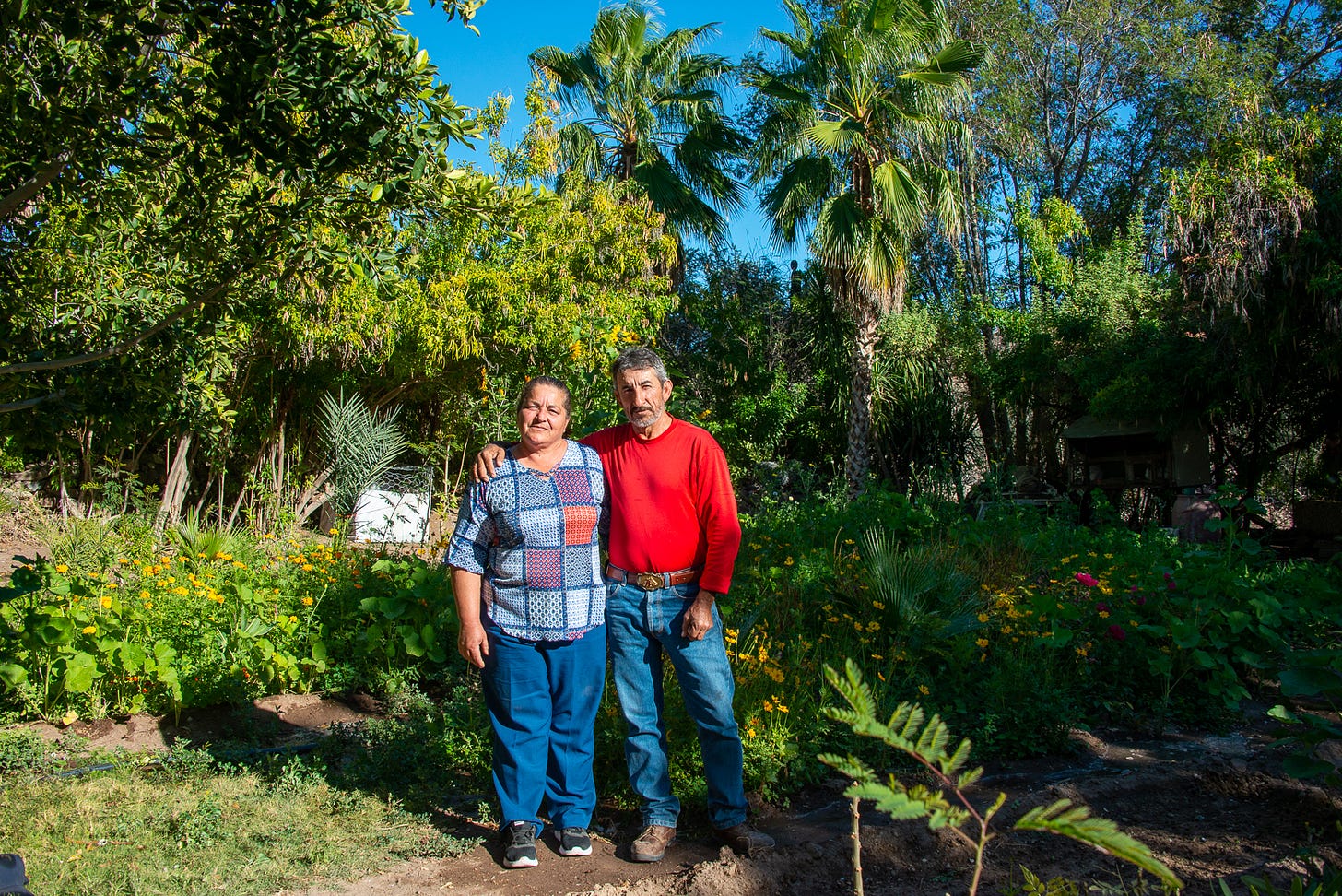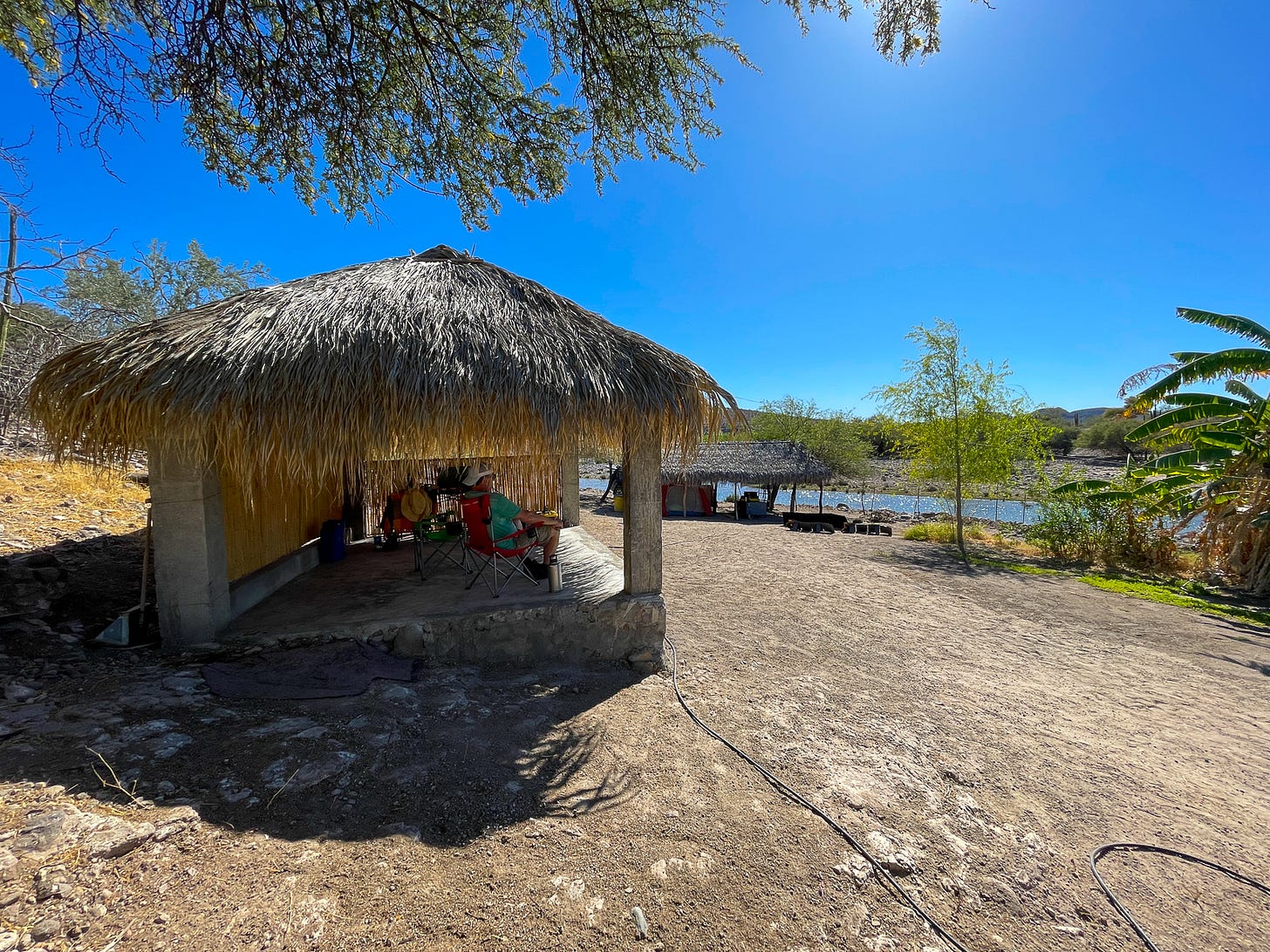Redefining What's Hip
How easy small talk can help big with the climate, a remote Baja ranchero, and a moment of presence.
Greetings, and welcome to Spring! What a mixed week it’s been.
We are currently in Baja, where the birds are endlessly chattering. Nests are going up. The sun’s rays are coming down. And the ocean breezes are laced with the smell of fresh flowers. We hear it’s snowing wildly at home, which would also be a joyous place to be right now.
In contrast, there’s the new-yet-not-at-all-surprising news from the latest installment of the IPCC climate report, unofficially dubbed our final warning for keeping global warming to 1.5 degrees.
I don’t want to talk about that much, because there is so much to be grateful and present for in this particularly peaceful, happy moment. But it’s been a while between posts, and I’ve been wanting to say hello. This seemed like a good moment. Hello!
But briefly I do want to share an idea about why we can’t seem to act on the IPCC science, because there is something easy that each of us can do to help in a fundamentally powerful way…
If we first go to the really big picture — globally, perhaps we’re not acting with the urgency we clearly need, because we seem to be rooted in the trifecta of an inability to cooperate, a lack of empathy (especially among the wealthy), and a lack of imagination.
Lack of cooperation: To financially achieve keeping global temps at 1.5C means upping global climate investments by 1.8 to 3.6 trillion dollars annually until we get the infrastructure in place. That sounds like a lot, but for perspective, our country’s annual defense budget is nearly 1.8 trillion. So the real problem isn’t money, it’s that wealthy nations don’t want to change the status quo, plus they particularly aren’t lining up give developing nations the resources they need to reach their climate goals (which would only seem fair as wealthy nations got their wealth from exploiting those countries, and those countries are for the most part getting hit the hardest with the early problems of climate change).
Alas, economics (both global and personal) have not been something I’ve devoted any part of my life to understanding, but this column by Robert Reich is really great for explaining the wealth gap, in an entertaining and thoughtful way to people like me who are mostly ignorant in such matters, on a real-time basis with current events.

Coming up short on empathy: Again, in the really big picture, I was talking with a wise person I know, about what the “____” is wrong with some of our political and corporate leaders. I suggested the obvious greed and power-lust, but he said he’s now thinking those are just symptoms of a lack of empathy. That makes sense. But regardless of what the root of these nefarious character traits of our leaders, the wealth gap didn’t just appear from some glitch of capitalism. It was installed, with a lot of behind-the-scenes effort over the course of my lifetime. And the people who put it there are those who really like money and power.
Thus, our global lack of cooperation is due to the decisions of individual people. It is individual people, or groups of individuals, making these destructive decisions of action and inaction.
In my mind, super-charged traits like greed and power-lust should be identified as diseases, not held up in our society as the hallmarks of what we’re all striving for. After all, anyone who feels the need to hoard such an extreme amount of resources is a detriment for all of us humans and all of the species we share this planet with.
Which brings us to what we can do. Supercharge our imaginations.
In the same way the ‘80s built up the idea of materialism, the 2020s can dismantle it through art, culture, journalism and education. A shift in cultural perspective can quickly give foothold to more positive traits, and push those un-empathetic traits out the window. This is a shallow example, but take something like a big, loud pickup truck. People drive them because they think they’re cool. But if the new summer blockbuster puts the sexy hero on a bicycle and subtlety points out that pickups are totally uncool because they’re poisoning all of us, plus not really enjoyable as daily drivers, that helps the shift.
And we can all help the shift. Good ideas spread and we can all help spread them. To our friends and neighbors. To our politicians. To our bosses. Let’s all be an active part of that culture shift.
Besides manifesting the human traits we want to celebrate, we’ll also need to imagine the world that we’re trying to create, because big changes are happening quickly, and we need to make sure that in our haste we’re not making the same old mistakes all over again. For example, as the High Country News pointed out, why not put solar arrays on the roofs of big box stores instead of destroying pristine wilderness with solar farms? And of course, instead of just replacing every gas-powered car with an electric one, wouldn’t it be much better to reduce our need for cars altogether, and shift our economy away from being based on growth (which is ultimately also unsustainable even if we fix the carbon problem)? When we stimulate our global consciousness with such questions, good outcomes are sure to advance.
On that imagination note, if you want some climate hope, and some joyful ideas to ponder in an afternoon hammock daydream, this column by Rebecca Solnit in this week’s Washington Post is must read. And speaking of peaceful, happy moments, days like mine today are evermore important to cherish. Moments of peace and happiness aren’t always planned, but when they come, make sure to be ready to drop what you’re doing and fully enjoy each moment. Be present. This moment, right now, is all we actually have.
Okay, I’m off to the beach to watch gray whales spout, after two more thoughts:
A quick horn toot
I’ve had a rather wonderful month for published articles. Besides my normal myriad of online regulars, I got to feature my old friends and their upcoming final search for the slave ship Guerrero for Atlas Obscura. It’s a group of people and story that have been central to my life since I directed a documentary about it two decades ago.
Then, one of my essays, about the aftermath of the Keys hurricane, made it into the literary magazine Hairstreak Butterfly Review. And I can’t link to these others, but if you’re near a bookstore, you can find hard copies there: I made the cover of Reader’s Digest! Yes, it is still in print. And best of all, it’s advocating for getting rid of lawns. See, these ideas can become mainstream! Utah, please read it. You know why.

Also, one of my photos is in Orion, on the murmurations photo collage; an image of a sign my dad and I hiked by on the Camino de Santiago some years ago. And an article on balancing outside home lighting to be compatible with safety and dark skies was in this month’s Family Handyman. I think it’ll be next month’s edition when Steve and I have a joint article about how to build a hydroponic garden.
A Parting Thought
On this trip we camped on a ranchero (a small, rural farm) for the first time. Their land is on an oasis and their house built on the ruins of an old Spanish mission. The family who owns it — a couple, their grown son and his wife — is setting up a small campground, which they hope might draw in a few visitors from the nearby Baja Divide Trail bicycle/overland route.
The father, Maximo, said that his family has lived there since before the mission was built in the 1600s. He took us on a long walk to show us his land. We don’t speak great Spanish (yet), and he spoke zero English, but we could clearly understand him when he said (in Spanish), “We don’t have any money but we have everything we need. All of the peace and happiness in the world.” He beamed, every moment. He really meant it. We agreed.





